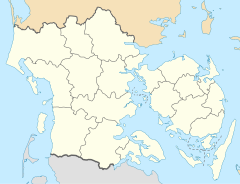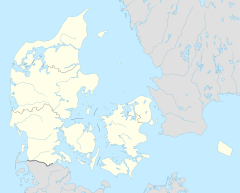Bramming railway station
Bramming | ||||||||||||||||||||||||||
|---|---|---|---|---|---|---|---|---|---|---|---|---|---|---|---|---|---|---|---|---|---|---|---|---|---|---|
| railway station | ||||||||||||||||||||||||||
 Bramming station in 2022 | ||||||||||||||||||||||||||
| General information | ||||||||||||||||||||||||||
| Location | Jernbanegade 9 6740 Bramming[1][2] Esbjerg Municipality Denmark | |||||||||||||||||||||||||
| Coordinates | 55°27′52.73″N 8°42′25.69″E / 55.4646472°N 8.7071361°E | |||||||||||||||||||||||||
| Elevation | 12.1 metres (40 ft)[3] | |||||||||||||||||||||||||
| Owned by | Banedanmark | |||||||||||||||||||||||||
| Operated by | DSB[1] and GoCollective[4] | |||||||||||||||||||||||||
| Line(s) |
| |||||||||||||||||||||||||
| Platforms | 2 | |||||||||||||||||||||||||
| Tracks | 3 | |||||||||||||||||||||||||
| Construction | ||||||||||||||||||||||||||
| Architect | Niels Peder Christian Holsøe[5] | |||||||||||||||||||||||||
| Other information | ||||||||||||||||||||||||||
| Station code | Bm[6] | |||||||||||||||||||||||||
| Website | Official website | |||||||||||||||||||||||||
| History | ||||||||||||||||||||||||||
| Opened | 3 October 1874[3] | |||||||||||||||||||||||||
| Previous names | Bramminge | |||||||||||||||||||||||||
| Services | ||||||||||||||||||||||||||
| ||||||||||||||||||||||||||
| ||||||||||||||||||||||||||
Bramming railway station (previously: Bramminge) is a railway station serving the railway town of Bramming east of the city of Esbjerg in West Jutland, Denmark.[1][2]
Bramming railway station is located on the Lunderskov–Esbjerg railway line from Lunderskov to Esbjerg, and is also the northern terminal station of the Bramming–Tønder railway line. The station opened in 1874.[3] It offers InterCity services to Esbjerg and Copenhagen and regional rail services to Esbjerg, Fredericia and Aarhus operated by the national railway company DSB,[1] as well as regional rail services to Esbjerg, Ribe, Tønder, and Niebüll in Germany, operated by the private public transport company GoCollective.[4]
History
[edit]Bramming railway station opened on 3 October 1874 as on one of the original intermediate stations on the Lunderskov–Esbjerg railway line.[3]
Already the following year, the station became a railway junction as the railway line from Bramming to Ribe was opened on 1 May 1875.

The station was the site of the 1913 Bramminge train accident, when train 1029 (known as the Emigrant) servicing the route from Copenhagen to Esbjerg derailed soon after passing the station at Bramminge.
In 1916, Bramming station also became the southwestern terminus of the railway line from Bramming to Grindsted which opened on 1 December 1916 and in 1920 became a part of the new Langå-Bramming railway line.[7] The Langå-Bramming Line was closed in 1971.[8] Freight traffic on the section to Grindsted continued until May 2012.
Architecture
[edit]The still existing station building from 1874 was built to designs by the Danish architect Niels Peder Christian Holsøe, known for the numerous railway stations he designed across Denmark in his capacity of head architect of the Danish State Railways.[5]
Services
[edit]The station offers direct InterCity services to Esbjerg and Copenhagen and regional rail services to Esbjerg, Fredericia and Aarhus, both operated by the national railway company DSB,[1] as well as regional rail services to Esbjerg, Ribe, Tønder, and Niebüll in Germany, operated by the private public transport company GoCollective.[4]
Gallery
[edit]See also
[edit]- Bramminge train accident
- List of railway stations in Denmark
- Rail transport in Denmark
- History of rail transport in Denmark
- Transport in Denmark
References
[edit]Citations
[edit]- ^ a b c d e "Bramming Station" (in Danish). DSB. Retrieved 7 September 2024.
- ^ a b "Bramming Station" (in Danish). GoCollective. Retrieved 7 September 2024.
- ^ a b c d "Bramming Station (Bm)". danskejernbaner.dk (in Danish). Retrieved 7 September 2024.
- ^ a b c "Om GoCollective – Tog" (in Danish). GoCollective. Retrieved 7 September 2024.
- ^ a b Vigand Rasmussen. "N.P. Holsøe" (in Danish). Kunstindeks Danmark & Weilbach Kunstnerleksikon. Retrieved 19 October 2022.
- ^ "Stationsforkortelser" (in Danish). DSB. Retrieved April 12, 2024.
- ^ Jensen 1979, p. 50.
- ^ Jensen 1979, p. 58.
Bibliography
[edit]- Jensen, Niels (1972). Danske Jernbaner 1847–1892 (in Danish). Copenhagen: J.Fr. Clausens Forlag. ISBN 87-11-01765-1.
- Jensen, Niels (1977). Vestjyske jernbaner (in Danish). Copenhagen: J.Fr. Clausens Forlag. ISBN 87-11-03821-7.
- Jensen, Niels (1979). Midtjyske jernbaner (in Danish). Copenhagen: J.Fr. Clausens Forlag. ISBN 87-11-03904-3.
External links
[edit]- Official website

- (in Danish) Banedanmark – government agency responsible for maintenance and traffic control of most of the Danish railway network
- (in Danish) DSB – national Danish train operating company
- (in Danish) GoCollective – private public transport company operating bus and train services in Denmark
- (in Danish) Danske Jernbaner – website with information on railway history in Denmark











